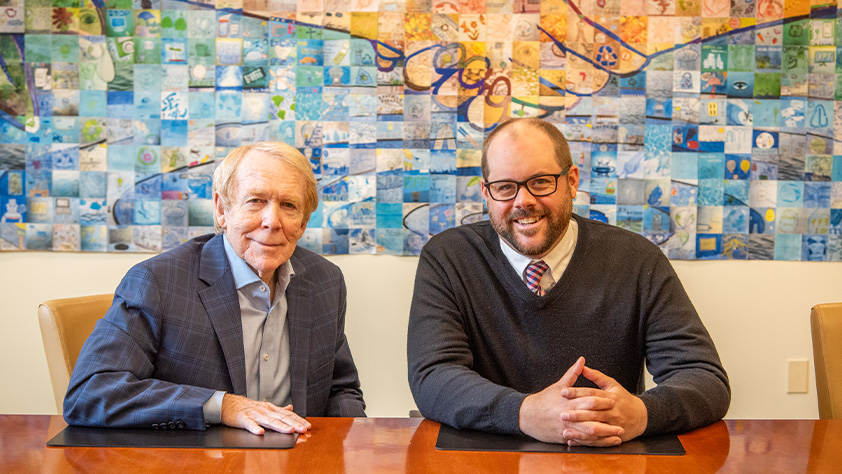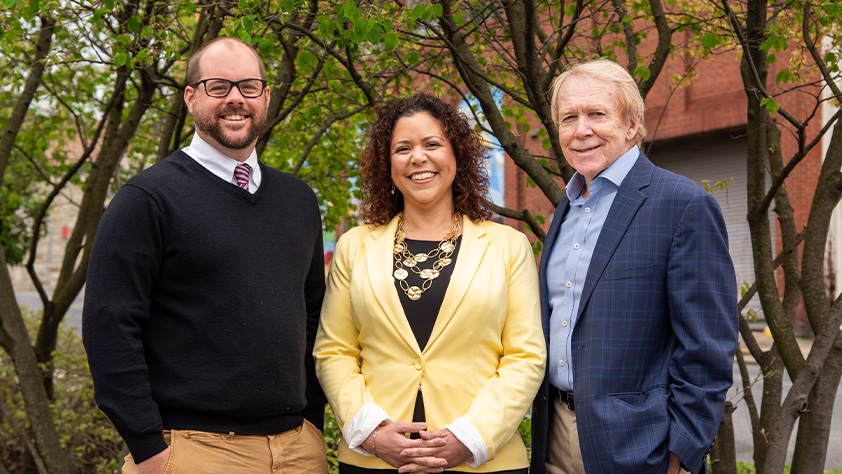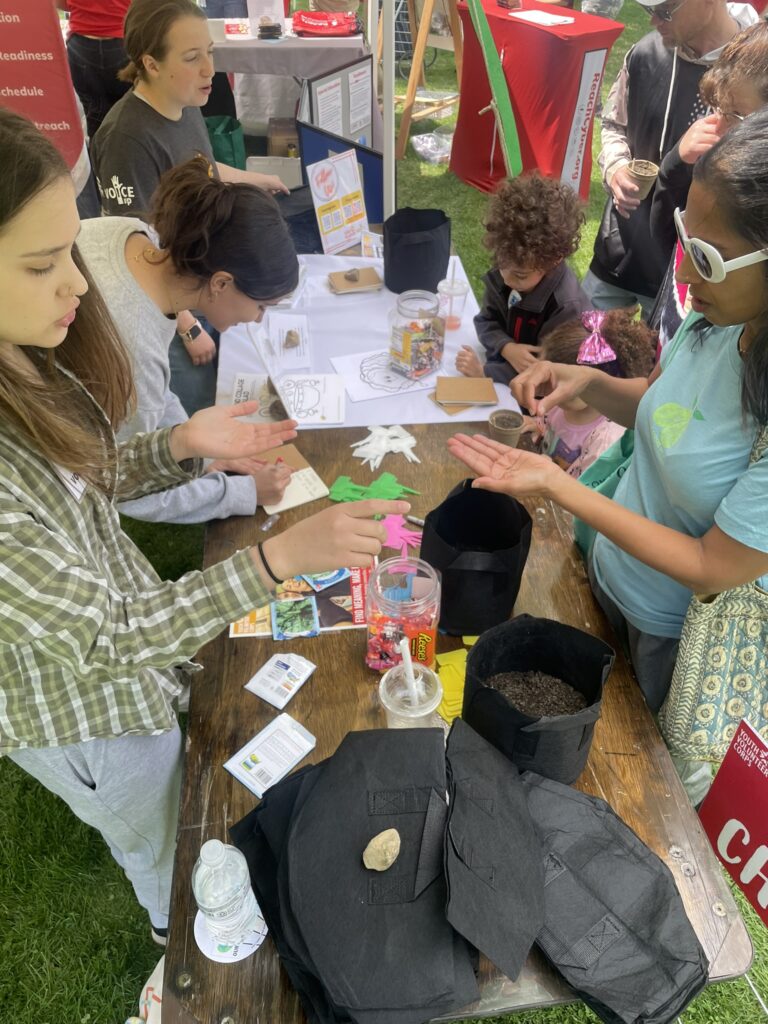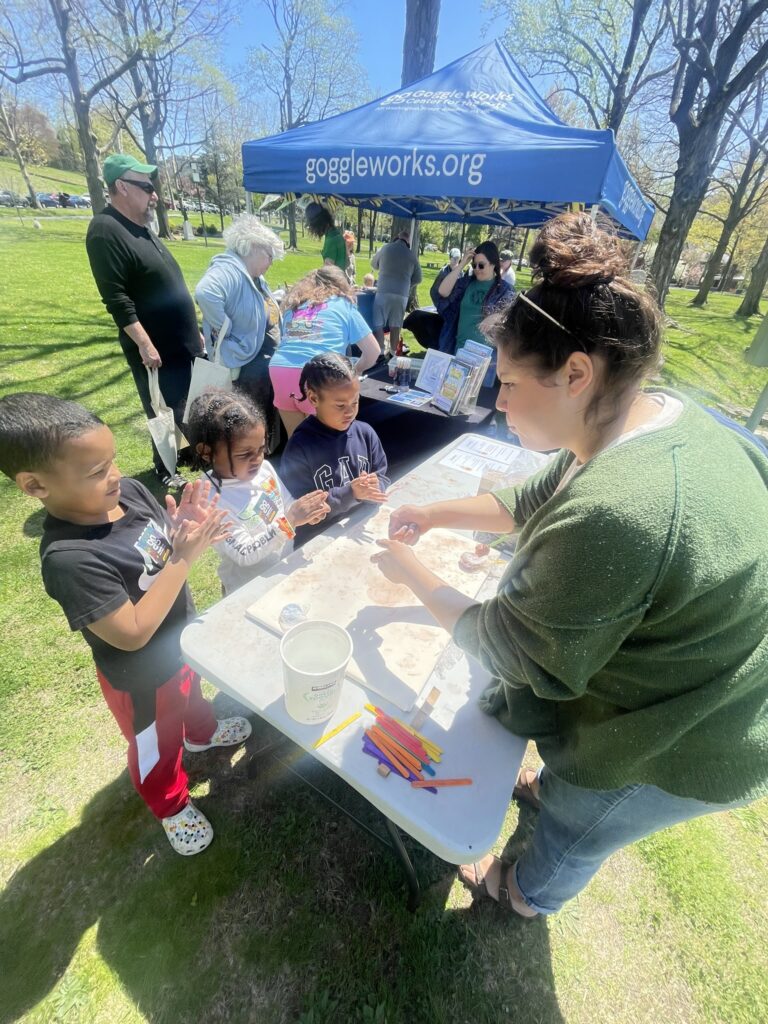The University of Pittsburgh at Bradford received one of 22 Governor’s Awards for Environmental Excellence for a rooftop solar array on the George B. Duke Engineering and Information Technologies Building.
This project was funded in part by support from the Metropolitan Edison/Pennsylvania Electric Company Sustainable Energy Fund, which is managed by Berks County Community Foundation and the Community Foundation for the Alleghenies respectively. Since its inception in 2000, this fund has awarded more than $33.9 million to sustainable energy projects in the area served by the Met-Ed and Penelec service territories in Pennsylvania.
The Metropolitan Edison/Pennsylvania Electric Company Sustainable Energy Fund granted $230,000 to support the installation of a 100 kilowatt-plus solar array on the rooftop of the George B. Duke Engineering and Information Technologies Building.
“Pitt-Bradford is committed to environmental and economic sustainability as well as providing leadership and service to our local and regional communities,” said Richard Esch, president of Pitt-Bradford. “This project not only generates energy to help supplement the power needs of the Duke Building, it also provides an educational tool for our campus and the community about the importance of sustainability and renewable energy.”
This solar array was installed and working in March 2023 and to date has generated over 60 megawatt hours of green electricity for Pitt-Bradford. In addition, the solar array is the largest rooftop solar array in the University of Pittsburgh system, and it provides over 40% of the Duke Building’s electricity.
More details on the project are available here.
Over our 30-year history, we have had the opportunity to meet with hundreds of people who wanted to make a difference in their community – to give back in support of a cause about which they cared deeply or in honor or memory of someone they loved or admired. Thousands of grants representing millions of dollars have been distributed in Berks County thanks to the foresight of those donors who trusted Berks County Community Foundation with their charitable gifts.
Every year or two, we update the Funds for Grants and Scholarships brochure, which lists the funds currently available for grantmaking and scholarship awards. Feel free to browse the brochure to learn more about how donors have supported individuals and organizations in our community – everything including animals, arts & culture, education, environment & energy, health & human services, neighborhoods & economic development, public safety, scholarships, and youth sports. You may find an opportunity for funding or inspiration for establishing your own fund.
Change starts with a spark. Your spark. We’re here to help – please reach out with any questions or ideas.
When I started at the Community Foundation 27 years ago, I spent 60% of my time marketing the Foundation to professional advisors – attorneys, accountants, trust officers, and financial advisors.
The Foundation was only three years old, so no one knew much about what a community foundation was or the fact that there were already 32 community foundations in Pennsylvania and 800 nationwide.
Many of the advisors thanked me for the introduction to the Community Foundation but made it clear that their professional practice did not include estate planning, and they would probably never be able to refer someone. Even so, over the past 27 years, many of those advisors who thought they would never have a client who would be able to work with the Foundation have since helped their clients establish funds with us.
I was not raised here, but one of the things I love about Berks County is the philanthropic nature of the community. I have witnessed firsthand people rallying to support a nonprofit organization that was struggling financially or a family or individual in need of help. The people I see helping are not high wealth individuals. They are regular folks who want to make people’s lives easier. You don’t see that in every community.
What I have found even more special is the inconspicuous nature of giving in this community. We established the Franklin Society over 15 years ago, – a legacy society to recognize those who have considered the Community Foundation in their estate plan. When we work with individuals on setting up a testamentary fund (one that will be funded upon their passing), we always ask if they would like to join the Franklin Society.
Since the Community Foundation was founded 30 years ago, 55 funds have been established as an estate bequest. We have worked with 90 other individuals who have named the Foundation in their estate plans.
Of those donors, we still only have twenty members of the Franklin Society. Berks Countians don’t give for recognition; they give to make sure something happens to benefit their community.
Even through economic downturns like 2008, the community did not stop giving. Those that could give gave more because they knew others were struggling.
It is that kind of philanthropic spirit that makes Berks County a special place.
In June 1994, I was hired as the first employee of Berks County Community Foundation. The foundation was a scrappy startup when it was founded 30 years ago. In its first full fiscal year, we were able to award four grants. Berks County and the Community Foundation have come a long way since then.
The idea of a community foundation for Berks County came from the Wyomissing Foundation. One of their board members was involved with the Triangle Community Foundation in North Carolina and asked why Berks County didn’t have a community Foundation. Alfred Hemmerich, a board member of Wyomissing Foundation, was particularly excited by the idea of a community foundation when asked why one did not exist in Berks County. Alfred took it upon himself to explore how community foundations worked and whether it would be possible to start one here.
And so, in June of 1994, Berks County Community Foundation began. The original board included members who were well-respected in Berks County. Although the Community Foundation was a brand-new organization with no track record, the board members’ reputations, along with the blessing of the Wyomissing Foundation, gave the community confidence in this new endeavor. People began to give money because they respected the civic leaders who were involved.
Fast forward to 2024. We now manage about $140 million in assets and nearly 400 funds that award grants and scholarships. Thousands of grants and scholarships have been distributed, totaling over $79 million, since our founding 30 years ago. Looking back, it is difficult to pick one grant, one event, or one initiative that makes me most proud.
The Community Foundation team works hard to bring organizations and individuals together to collaborate and create positive change, to provide more opportunities for nonprofits to thrive, and to inspire our residents to give to the causes about which they care the most.
A lot has changed in 30 years. But, for the Community Foundation, our mission to promote philanthropy and improve the quality of life for the residents of Berks County remains our North Star.
In March 2023, the Berks County Commissioners released a study about public health in our community. The report had four recommendations on how Berks County can support a healthier community. Leading the conversation are T.J. Huckleberry and Dr. Michael Baxter. I sat down with the two and had questions for them about the report’s recommendations. Get ready for insightful answers from experts in their field.

T.J. Huckleberry is the Executive Director of Berks County Medical Society. Berks County Medical Society serves members and the residents of Berks County, PA, with physician, hospital, and health-related information
Q: The commissioners released a report that provided four recommendations on how to create a healthier Berks County. What were your initial reactions to the report?
T.J.: This is the first tangible approach our county leadership has made towards addressing public health and wellness. It’s a great first step!
Dr. Baxter: The authors, Health Management Associates (HMA) of Philadelphia, did outstanding work reviewing the health problems and needs of Berks County. Their review and comparison of major health issues confronting Berks and five neighboring counties as well as comparing Berks with Pennsylvania and U.S. data was particularly enlightening.
Four recommendations:
1. Create a Berks County Health Director position to lead public health collective action and coordination and serve as a trusted communicator about public health information.
2. Establish a Public Health Advisory Panel and appoint members who can advise on public health assessment, assurance, and policy activities.
3. Support the establishment of a “Healthy Berks” coalition to serve as a coordinating body for public health efforts in the county.
4. Create a Berks County Health Data Analyst position to improve Berks County-specific public health data completeness and accuracy
Q: Why do you think it is important to educate the community on the report and its recommendations?
T.J.: These four pillars provide a blueprint for how we as a community can address and take control of our public health issues.
Q: If you had a magic wand, what are the top three wishes you would fulfill for Berks County to make it healthier?
Dr. Baxter: If I had to only choose three, I would like to see:
- Improved access to care for everyone with or without health insurance by increasing the numbers of primary care and mental health providers in Berks (in the HMA study, Berks was at the bottom of the number of such health providers per population).
- Healthier living for all (especially those with chronic diseases) by developing resources in the community for healthier diets and more easily accessed exercise and provider access.
- Proven efforts to address drug abuse and violence (especially guns) which have a devastating impact, especially on many young people.
T.J.: In addition to what Dr. Baxter mentioned, I’d also like to see increased avenues for mental health awareness and services.
Q: What initiatives can be implemented to improve healthcare access for individuals in Berks County?
Dr. Baxter: Access for all health services is a top priority. Increase the number of primary care and mental health providers as previously noted, and implement approaches (involving our health care institutions, schools, and others) to make such access available and affordable. Explore school-based clinics as a high priority for the physical and mental health challenges, especially facing children and youth.
Q: In what ways can we address healthcare disparities among different communities within Berks County?
Dr. Baxter: One way we can address the disparity is to use the data available through this study and the Hospital Community Health Needs Assessments to address identified problems throughout the county. This would be a priority for a County Health Director and a County Health Data analyst.
Q: How can we promote preventive healthcare measures to ensure better health outcomes for all Berks County residents?
Dr. Baxter: Health disparities which include the Social Determinants of Health must be a priority for any successful efforts to improve the health/public health of all the people of Berks County. Resources need to be coordinated between health care institutions, educational and religious groups, and the media to shine light on issues, the people most in need and the resources to meet those needs.
Q: What collaborative efforts can be made to strengthen the healthcare infrastructure in Berks County?
Dr. Baxter: A top priority would be to see our major health care institutions truly work together to improve the health of our people, but I have been waiting over 30 years for that to happen. I would hope a County Health Director, if not the full impact of a County Health Department, could help achieve that. In addition, we have many excellent organizations including the United Way and the Berks Community Health Center that could join forces to address many of our health and social determinants issues.
Q: One of the county health report’s recommendations is to create a Berks County Health Director position. We were introduced to the functions and responsibilities of local health directors during the COVID-19 pandemic. When they aren’t addressing emergency public health issues, what are some of their day-to-day responsibilities?
Dr. Baxter: A County Health Director would collect and organize data (with the assistance of the Data Coordinator), set priorities based on needs, coordinate efforts, and energize support (including political advocacy) to get things done that make a true impact.
Q: How could the recommendations in the county’s report supplement the work of local hospitals and the community health center? How do they differ?
Dr. Baxter: Our local “not for profit” hospitals are required by law to conduct their Community Health Needs Assessments every 3 years. They take this process seriously and perform a very valuable service. However, they are not government bodies with the resources to change policy, invest in public funding or change the dynamics of our community. While they are responsible for improving health, much of their effort is focused on the emergency and acute care needs readily addressed by a hospital. They can assist in these public health efforts but that is generally not their primary function.
Q: About half of Pennsylvanians are served by a local or municipal health department. Why is it important for the county to have taken on the issue of public health in Berks County, when they commissioned this study?
T.J.: A public health structure in Berks County would place a magnifying glass towards the preventative health concerns facing our friends and neighbors while creating an advocate for state funding and support from Harrisburg and Washington to address these issues. Public health not only prevents and educates against the spread of diseases but promotes healthy living among our community.
Dr. Baxter: Although there are only 7 County and 4 Municipal Health Departments in the Commonwealth of Pennsylvania, these departments cover a large proportion of the residents of Pennsylvania and, I argue, represent, in general, the economic hubs in PA. There is a direct link between health and economic success–healthy people in general are more economically successful and their communities are also more successful and vice versa. It is a responsibility of government then not only to promote the economic well-being of their communities but also the health of the residents of those communities. Government, with the support of the many resources that exist in their communities, is best poised to address the disparities and promote the policies that will build stronger healthier lives for all.

“Gaining insight into why it is important to have a County Health Department is the first step. Our goal is to educate the community on the benefits of a public health department. Fortunately, because of the Community General Hospital Healthcare Fund of Berks County Community Foundation, we were able to support a community conversation that our friends at Berks County Medical Society hosted. The conversation was held in September 2023 and gave residents a chance to ask questions about the four recommendations that resulted from the study. The study was released by Berks County Commissioners and conducted by Health Management Associates in March 2023. You can access the report by clicking here.”
Cindy Milian, Health & Human Services Program Officer
On May 21st, 2024, Berks County Community Foundation welcomed students and their families, donors and scholarship fund representatives, and community leaders to our annual Scholarship Luncheon. Excitement filled the ballroom as we prepared to recognize the remarkable achievements of local students and the generosity of donors who enable higher education dreams.
This year, the Community Foundation will award nearly $737,000, bringing the total amount disbursed since its inception in 1994 to an outstanding $13,691,935. Thousands of recipients have benefitted from these scholarships over the years as they continue to pursue higher education.
Among the recipients recognized was Vanesa Aguay, who received both the Berks’ Best Taylor Seitzinger Award for Community Service & Leadership and the Berks’ Best Computer Science Award. Her parents were the first in their family to graduate high school and college after immigrating from Ecuador. They instilled in Vanesa a strong work ethic and a desire to give back. Vanesa shared, “I wouldn’t be where I am now without my parents.” She continued, “These scholarships have propelled me to pursue my dream of becoming an engineer.” Vanesa aims to develop technology that will help address disparities in health care.
The annual Scholarship Luncheon showcases the power of community support in shaping the futures of lifelong learners. Each scholarship awarded provides resources and motivation for students to carve out their paths, creating an impact in Berks County and beyond.
Another recipient, Tanesha Purohit, received a scholarship from the Wilson Scholarship Fund. This scholarship, created to support graduating students from Wilson High School in any form of post-secondary education, prioritizes well-rounded individuals who excel in academics, extracurricular activities, and community service. Gary Coller, representing the fund, stated, “It’s important to provide financial help to students as they start their educational journeys and give them access to the necessary experiences.”
Looking to make a difference in the lives of local students through educational support? Give to one of our many scholarship funds today!
Have you ever considered giving to Berks County Community Foundation? If you have thought about giving to the Community Foundation, you may not even know where to begin. With nearly 400 funds managed by the Community Foundation, there are many options for you to decide how to give. We can help guide you in determining how and where to make an impact.
Maybe you think that giving to the Community Foundation is only for donors with deep pockets who can establish a fund. Perhaps you don’t know anyone else who has ever given to the Community Foundation. What you might not know is that many people – from Berks County to international donors – have decided to donate to Berks County Community Foundation over our 30-year history, from just a few dollars to multimillion-dollar gifts.
Many of our donors contribute to funds created by others in the community to support nonprofit organizations or fields of interest. Others contribute to funds established in honor or memory of someone important to them. Donations are also made to support crises or other pressing needs in the community. Even the smallest donation can spark change for a cause that can create a lasting impact in the community. In 2023, over 1,400 people gave charitable gifts to 120 funds.
If you aren’t sure where to begin, our Fund Directory is a great place to start. You can search through the alphabetical list of funds that donors have established, or you can enter a word or two in the search box to help narrow down your options. You can also narrow down the list by searching by region, field of interest, or type of fund.
If you are interested in setting up your own fund to support an organization or area of interest that means a lot to you, try our Create Your Own Fund Quiz. This is a short questionnaire to help determine the best method of giving for you.
Whether you want to donate to an existing fund to support a cause you care about or start a fund of your own, we’re here to help turn your spark of generosity into action. Please email mollyr@bccf.org or call 610-685-2223 to start the conversation. We are here to help.
Every year, Earth Day is celebrated across the globe with tree plantings, festivals, and various volunteer activities that remind us of our collective responsibility to steward the natural environment and limit impacts on the earth.
The Berks County Earth Day Committee hosts an Earth Day celebration every year to bring the community together and educate about environmental and conservation subjects while encouraging participants to make sustainable choices. Thousands of people gathered in City Park on April 20 to enjoy live music and food from local vendors and participate in a range of educational activities from planting seeds and trees to litter clean ups to wildlife demonstrations.
“The pure joy of seeing little ones bouncing from booth to booth, learning about our Earth, made my heart smile. They’re the future of our planet, and their enthusiasm gives me hope for a brighter tomorrow,” said Lazarely Martinez, a first-time attendee of the Earth Day celebration in City Park.
The Youth Volunteer Corps held a table at the event that promoted planting vegetables in a bag. The bag was recyclable, and dirt was donated from Ridgewood Soils in Birdsboro. Kids of all ages were instructed to scoop dirt into their bags and then were provided with lettuce or spinach seeds to plant in the soil. Participants were encouraged to place the bags in sunlight and watered regularly. When leaves start to sprout, they can be cut and are ready to be eaten.
“I like spinach because it makes me feel strong and planting it makes me feel like a farmer,” said Avian Robles, an 8-year-old student at Muhlenberg Elementary Center after planting his spinach planted bag.
At the Community Foundation, our goal is to keep Berks County a beautiful place by supporting projects and programs that recognize the value of our open space and provide education on how to reduce our impact on the planet. The Earth Day celebration was made possible by the Hawley and Myrtle Quier Fund of Berks County Community Foundation. This fund makes distributions to improve the quality of life for the residents of Berks County. This support not only benefits the present generation but also lays the foundation for a more sustainable future for generations to come.




Over 100 students from the Berks County school districts came together on April 8th, 2024 at Muhlenberg High School for a mental health event. This inaugural event was created by the Youth Mental Health Ambassadors of Youth Volunteer Corps (YVC), along with students from Muhlenberg High School’s Avedium Club who saw the need in our community.
In the past decade, research has proven that psychological stress influences the physical body and can sometimes lead to death. According to the Centers for Disease Control and Prevention (CDC), the second leading cause of death among individuals between the ages of 10 and 24 is suicide. The World Health Organization (WHO) reports that that one in seven 10 to 19-year-olds experience mental health conditions that are largely unrecognized and untreated.
The youth-driven and youth-led Building Unity in Our Community event took place on Monday, April 8th. Student participants received information on mental health from local therapist Paige Schoelkofp from As You Are Counseling Services and from a youth-led panel discussion. Coping skills stations were set up to focus on art therapy, music therapy, journaling, equine therapy, and more! Each station had a hands-on experience. Students were able to participate and ask questions throughout the day.
This program was funded by the Home Health Care Foundation Fund of the Berks County Community Foundation. The Home Health Care Foundation Fund provides grants to organizations and programs that support preventative healthcare, community health, health-related charity care, and/or support in recovering from illness or a disability at home. This fund is available to organizations and programs that serve Berks County and/or those counties that are contiguous to it. To learn more about the fund, please click here.
“Without the funding, I strongly feel that our students would have made the program successful because of how passionate they are,” Lindsay Sites, YVC Program Director at VOiCEup Berks said. “Because of the funding, we were able to have a bigger impact and a bigger reach.”
VOiCEup Berks is an official affiliate of YVC. VOiCEup Berks creates opportunities for people to volunteer, learn and lead in their communities. YVC is a team-based service-learning program for youth ages 11-18. One of the many goals of YVC is to inspire youth to a lifetime commitment to service.
“I wanted to be part of YVC because my goal is to reduce the negative stigma related to mental health. When I graduate and move on from high school, my goal is for the students that come after me to continue reducing the stigma,” Addison McKittrick from Exeter High School said.
To learn more about VOiCEup Berks and how you can get involved, please click here.
Berks County is home to hundreds of houses of worship in both the urban and rural areas, many built throughout the 1700s and 1800s. These buildings have been vital cultural vehicles that have helped knit the fabric of our cultural heritage for generations. But these sacred places are at risk, like many others across America. With this threat to Berks County’s sacred places in mind, it’s important to preserve the contributions that are being made in the community. Sacred places are ubiquitous in our communities, forming an integral part of social safety nets. This started the “Sacred Places” project to set out to build an inventory of the purpose-built sacred places within the city.
Berks County Community Foundation is collaborating with Partners for Sacred Spaces, a Philadelphia-based nonprofit that brings people together to find creative ways to maintain and make the most of America’s older and historic houses of worship.
For more than five years, Partners for Sacred Places and Berks County Community Foundation have collected the history of local houses of worship, assessed the condition of the buildings and the stability of their congregations, and encouraged partnerships to preserve these sacred places.
As a result, the Community Foundation will continue its partnership with Partners for Sacred Places in 2024 to provide its New Dollars/New Partners program. Several congregations spanning across denominations, locations, sizes, and missions – will have the opportunity to focus on building capacity to better serve their communities as anchor institutions, nurture transformation, and shape vibrant, creative communities.
If you lead or volunteer with a congregation in Berks County, we invite you to a free informational session on Thursday, April 18, 2024, at 6:00 pm at Berks Nature (575 St. Bernardine Street, Reading, PA 19607).
You can register for the informational session by clicking here. In the months that follow, the New Dollars/New Partners training program will be available for congregations interested in participating.
Funding for this project came from James P. Born, Sr. Fund of Berks County Community Foundation. The fund supports local houses of worship, interfaith dialogue, and inclusive programs for all children, including those who are underprivileged.
We look forward to seeing you at the session and collaborating with places of worship in Berks County.


